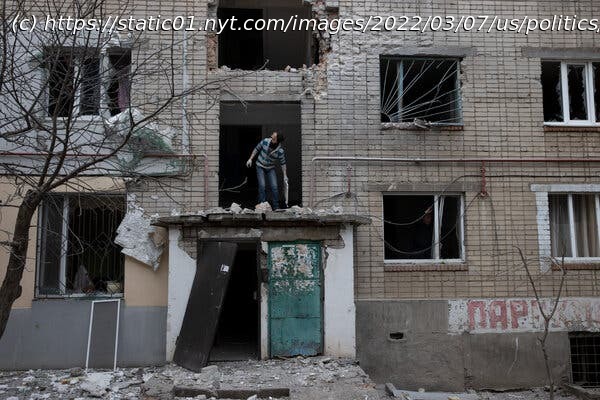President Vladimir Putin could still reduce cities in Ukraine to rubble, officials say. But European countries that once feared Russia say they are not so scared anymore.
When it comes to war, generals say that “mass matters.” But nearly two weeks into President Vladimir V. Putin’s invasion of Ukraine — Europe’s largest land war since 1945 — the image of a Russian military as one that other countries should fear, let alone emulate, has been shattered. Ukraine’s military, which is dwarfed by the Russian force in most ways, has somehow managed to stymie its opponent. Ukrainian soldiers have killed more than 3,000 Russian troops, according to conservative estimates by American officials. Ukraine has shot down military transport planes carrying Russian paratroopers, downed helicopters and blown holes in Russia’s convoys using American anti-tank missiles and armed drones supplied by Turkey, these officials said, citing confidential U.S. intelligence assessments. The Russian soldiers have been plagued by poor morale as well as fuel and food shortages. Some troops have crossed the border with MREs (meals ready to eat) that expired in 2002, U.S. and other Western officials said, and others have surrendered and sabotaged their own vehicles to avoid fighting. To be sure, most military experts say that Russia will eventually subdue Ukraine’s army. Russia’s military, at 900,000 active duty troops and two million reservists, is eight times the size of Ukraine’s. Russia has advanced fighter planes, a formidable navy and marines capable of multiple amphibious landings, as they proved early in the invasion when they launched from the Black Sea and headed toward the city of Mariupol. And the Western governments that have spoken openly about Russia’s military failings are eager to spread the word to help damage Russian morale and bolster the Ukrainians. But with each day that Ukrainian President Volodymyr Zelensky holds out, the scenes of a frustrated Russia pounding, but not managing to finish off, a smaller opponent dominate screens around the world. The result: Militaries in Europe that once feared Russia say they are not as intimidated by Russian ground forces as they were in the past. That Russia has so quickly abandoned surgical strikes, instead killing civilians trying to flee, could damage Mr. Putin’s chances of winning a long-term war in Ukraine. The brutal tactics may eventually overwhelm Ukraine’s defenses, but they will almost certainly fuel a bloody insurgency that could bog down Russia for years, military analysts say. Most of all, Russia has exposed to its European neighbors and American rivals gaps in its military strategy that can be exploited in future battles. “Today what I have seen is that even this huge army or military is not so huge,” said Lt. Gen. Martin Herem, Estonia’s chief of defense, during a news conference at an air base in northern Estonia with Gen. Mark A. Milley, the chairman of the U.S. Joint Chiefs of Staff. General Herem’s colleague and the air force chief, Brig. Gen. Rauno Sirk, in an interview with a local newspaper, was even more blunt in his assessment of the Russian air force. “If you look at what’s on the other side, you’ll see that there isn’t really an opponent anymore,” he said.






